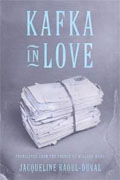Kafka in Love
Jacqueline Raoul-Duval
book reviews:
· general fiction
· chick lit/romance
· sci-fi/fantasy
· graphic novels
· nonfiction
· audio books
· author interviews
· children's books @
curledupkids.com
· DVD reviews @
curledupdvd.com
newsletter
win books
buy online
links
home
for authors
& publishers
for reviewers

 |
Kafka in Love Jacqueline Raoul-Duval Other Press Paperback 288 pages November 2012 |
|
What started as a biography of writer Franz Kafka from the perspective of his diaries and his correspondence with his four fiancées has resulted in a lustrous work of fiction by Jacqueline Raoul-Duval. Best known as the author of “The Metamorphosis,” Kafka seems to saunter off the page right into our hearts. Kafka’s dear friends, like the ever-dedicated Max Brod, earn our respect, and several fiancées (Milena Jesenské and Dora Diamont) merit fervent declarations to discover more about their lives. Raoul-Duval started her pleasing affair with Kafka’s love life after reading about his spinning of a sweet story for a young girl mourning a lost doll. Researching who related this lovely memory led the author to one of his fiancées.
“Between himself and Milena is not a wall but a grave. Yet sexual desire inflames him, tortures him day and night. ‘To satisfy it,’ he writes, ‘I would have to overcome my fear, my sense of modesty, and also my sadness.’”Willard Wood’s translation is exemplary; not a single phrase seems out of place or awkward. While Kafka’s writing is now a literature class staple (especially the tale of a son transforming into a horrid insect), he was almost unknown during his short lifetime. After Hitler’s sweep through Europe, Jews particularly embraced Kafka’s twisted takes on alienation and anxiety in an often hostile world. The fact that he lived most of his life in Prague, surrounded by anti-Semitism, has been likened to the cockroach staying where it is sure to be flattened. Much has also been made of the writer’s relationship with his burly, demanding father who consistently expressed his disappointment with Kafka. “‘Will my father dog me to the grave?’ he asks Dora.” The author builds our understanding of Kafka’s peculiar relationships with members of the opposite sex from the first page of this book. While quite a social man (even termed a dandy and a flirt in his younger, healthier days), the struggling writer finds it easiest to be intimate on the page. He always chooses long-distance loves and is hesitant to make permanent plans to relocate himself or them. Admiring his first fiancée, Felice Bauer, from afar suits him. Only as Kafka matures does he find solace with a more experienced woman, and then finally is able to relax with the physical intimacy of living with Dora. His demeanor with his favorite sister, Ottla, may have been the precursor for his vision of closeness with other women. Relations with prostitutes darken his sexual outlook. Happily Kafka’s behavior toward his beloveds advances from quite hateful to indifferent to ardent and then to loving and thankful. Right after he berates Felice into agreeing to be his wife, his deeper feelings are revealed: “Then you are prepared in spite of everything to take up this cross, Felice? Attempt the impossible?” Perhaps that is what makes Franz continue to be appealing: he admits to wrestling with inner demons and seems to plea for help in overcoming them. It is not just his sexual misgivings that foretell a difficult life with Franz; he embraces then-odd habits (sleeping in a cold room, swimming at every opportunity, and avoiding meat and alcohol) and cannot foresee financial independence from his parents. Kafka often produces his best work following the ending of an engagement—perhaps the relief of escape energizes him. Or perhaps his emotions run so deep that he exhausts himself expressing these desires. Certainly his writing picks at inner ravages: “’Seeing the flames devour my manuscripts soothes me. The more I burn, the more I am freed of my demons, I slip between their fingers.’”The author of Kafka in Love Toward the end of this fast read, Raoul-Duval depicts a scene where Kafka reduces a visiting writer to tears. It seems he can’t lie about the quality of submitted writing. I believe he would be quite content with this biographical novel based on the many loves of his life. Originally published on Curled Up With A Good Book at www.curledup.com. © Leslie Raith, 2013 |
|
|
|
 Click here to learn more about this month's sponsor! |
|
| fiction · sf/f · comic books · nonfiction · audio newsletter · free book contest · buy books online review index · links · · authors & publishers reviewers |
|
| site by ELBO Computing Resources, Inc. | |
 Raoul-Duval’s words flow beautifully around direct quotations from the many existing Kafka letters and notebooks that survived despite the ravages of World War II (particularly astounding considering his Jewish heritage).
Raoul-Duval’s words flow beautifully around direct quotations from the many existing Kafka letters and notebooks that survived despite the ravages of World War II (particularly astounding considering his Jewish heritage).